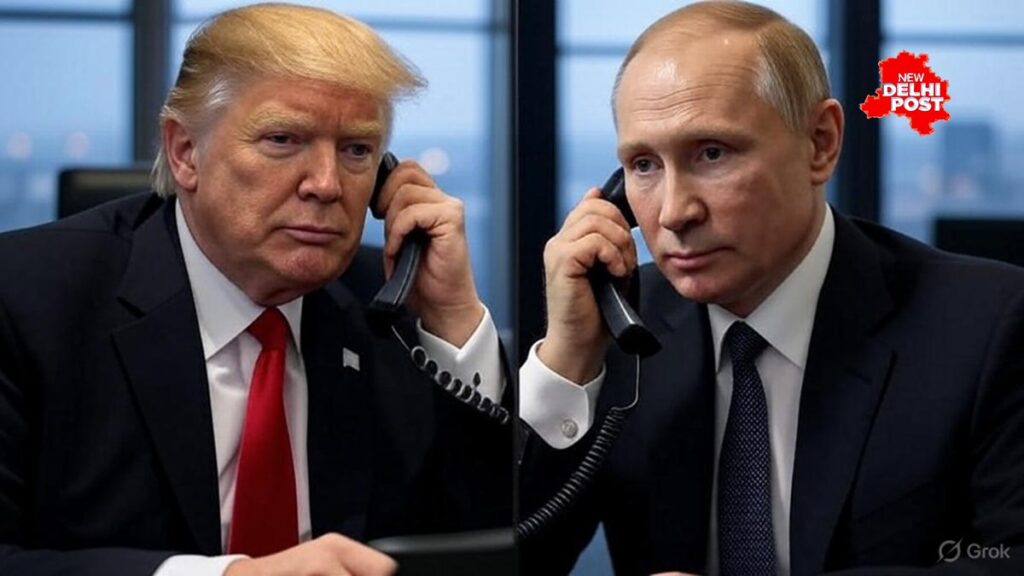A recent phone call between Putin and Trump highlighted the India-Pakistan conflict, with Trump claiming credit for halting hostilities, while India insists on its military diplomacy.
Moscow– On June 4, 2025, a phone call between Russian President Vladimir Putin and US President Donald Trump brought the recent India-Pakistan conflict into focus, with Trump asserting he played a pivotal role in stopping the escalation, according to Kremlin aide Yury Ushakov.
Trump’s Claim and India’s Rebuttal
Ushakov, quoted by Russia’s TASS news agency, stated, “They also touched upon the Middle East and the armed conflict between India and Pakistan, which was stopped with the personal participation of President Trump.” However, India has firmly rejected this narrative, emphasizing that the ceasefire on May 10, 2025, was achieved through direct talks between the Directors General of Military Operations (DGMOs) of both nations. Indian Foreign Secretary Vikram Misri reiterated, “The cessation of hostilities was a bilateral effort, not influenced by third-party mediation.”
Roots of the Conflict and Military Response
The conflict ignited after a terror attack in Pahalgam on April 22, 2025, killed 26 civilians, prompting India to launch “Operation Sindoor” on May 7. India conducted precision strikes on nine terror camps in Pakistan and Pakistan-occupied Kashmir, targeting Lashkar-e-Taiba and Jaish-e-Mohammed bases. Pakistan retaliated with aerial attacks on Indian military bases over the next three days, leading to a fierce 88-hour conflict. The skirmish ended with a DGMO-brokered ceasefire, though both sides reported violations shortly after, with India accusing Pakistan of deploying drones over Kashmir and Punjab.
Pakistan’s Plea to Russia and India’s Diplomatic Push
Pakistan’s Prime Minister Shehbaz Sharif sought Russian intervention by sending a letter to Putin via his aide Syed Tariq Fatemi, who met Russian Foreign Minister Sergey Lavrov in Moscow on June 3, 2025. Fatemi expressed Pakistan’s willingness for dialogue, stating, “We are ready to sit down with them at the negotiating table.” Meanwhile, India strengthened its stance in Moscow through a parliamentary delegation led by DMK MP Kanimozhi Karunanidhi, which secured Russian support for India’s zero-tolerance policy against terrorism. Kanimozhi emphasized, “Resolving issues with Pakistan involves more than just talks; it’s about addressing their role in global terrorism.”
Global Stakes and Nuclear Concerns
The India-Pakistan conflict has drawn international attention due to its nuclear implications. A 2024 study by the Stockholm International Peace Research Institute (SIPRI) warned that both nations possess over 150 nuclear warheads each, making any escalation a global security threat. US analyst Michael Kugelman noted, “The ceasefire was hastily cobbled together, and its fragility underscores the need for sustained diplomatic efforts.” The US, UK, and EU have welcomed the truce, with British Foreign Minister David Lammy urging both nations to sustain de-escalation efforts.
Economic Fallout and Regional Impact
India’s suspension of the Indus Waters Treaty post-Pahalgam attack has severely impacted Pakistan’s agriculture, with economic losses estimated at $500 million due to trade sanctions. Pakistani PM Sharif, in a televised address on May 10, 2025, claimed victory and thanked the US, China, and Gulf nations for their role in the ceasefire. However, India’s PM Narendra Modi, in a June 4 speech, warned, “If another terrorist attack occurs, a strong response will be given,” signaling continued vigilance.
A Fragile Peace Under Global Watch
The India-Pakistan conflict remains a flashpoint, with global powers like Russia and the US closely monitoring the situation. While diplomatic efforts continue, the mistrust between the two nuclear-armed neighbors highlights the urgent need for a lasting resolution to prevent further escalation.


